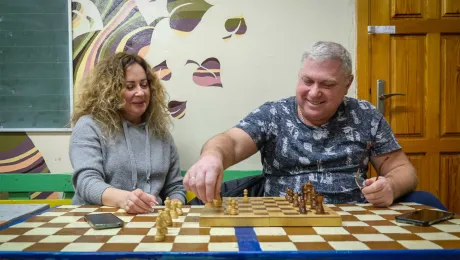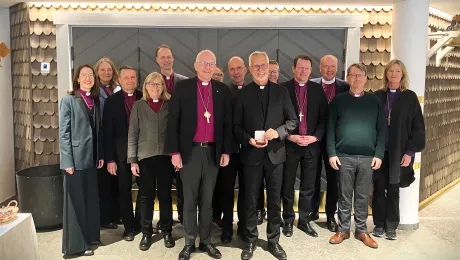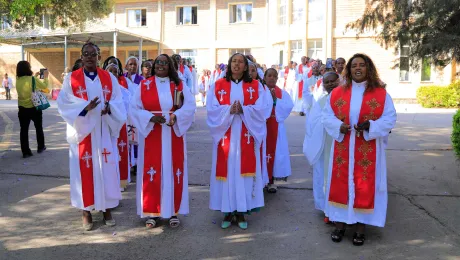Poland hosts 1.5 million officially registered refugees from Ukraine. Twenty live in Betania, a holiday home of The Evangelical Church of the Augsburg Confession in Poland in the Cieszyn Diocese near Bielsko-Biala.
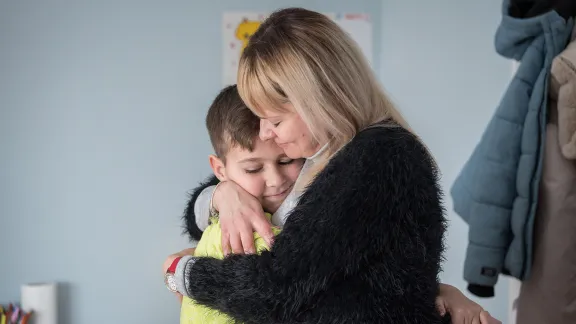
“My son is safe here”: Nataliia Bakumenko hugs her son Artem. Photo: LWF/Albin Hillert
LWF member church in Poland gives home to refugees
(LWI) - "As for me and my house, we will serve the Lord."
The Bible quote from Joshua 24:15, on an inside archway of Betania house in the Wapienica area of Bielsko-Biała is worn. It had strengthened it’s the house’s visitors through communist times when it was unpopular to declare one’s affiliation with the church, and the house was a holiday home for Lutheran children in Silesia. Three years ago, the Cieszyn Diocese of the Evangelical Church of the Augsburg Confession in Poland bought the house for a similar purpose. in March 2022, Betania became the home of people who fled the war in Ukraine – seven families now.
One of them joined the Lutheran Sunday service at the small chapel: Nataliia Bakumenko and her son. Natalia comes form Pryluky, and now works with Ukrainian refugees at the LWF community center in Bielsko-Biała. Ten-year-old Artem prefers to stay with his mother rather than join the other children in Sunday school. The family is orthodox, and attending the Lutheran services every second Sunday was Artem's wish. "He tells me that he does not have nightmares after church," Nataliia says.
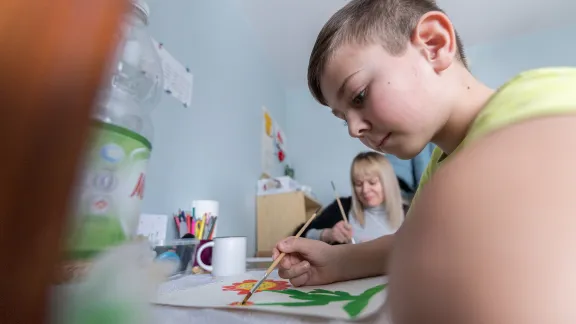
Artem (10) and his mother Nataliia from Pryluky, Chernihiv district, paint in their room in Betania house. Photo: LWF/ Albin Hillert
"My son is safe here."
Nataliia and Artem's hometown is in the Chernihiv district, close to the Russian border, where LWF World Service currently supports communities by rehabilitating critical infrastructure. Natalia and her son have not seen the destruction there; they left in the first days of the war. "The route of the invading army led through our town," says Nataliia. "At first, I was not sure it was the right decision to leave, but when we arrived here, my son said: Mama, I can look outside the window. It is no longer dangerous. Then I knew I had done the right thing. My son is safe here."
The word refugee creates a distance. There is no distance in the word guests.
– Adam BUJOK, Evangelical Church of the Augsburg Confession in Poland
In the parish, the Ukrainians are called guests, not refugees. "In my opinion, it is nicer," says Adam Bujok, assistant to the bishop and the vicar who leads Sunday service that day. "The word refugee creates a distance. There is no distance in the word guests."
"Pan Adam" is one of the primary contacts if Ukrainian families need something, if there is a problem, and if someone wants to talk. So far, he was approached about practical help rather than spiritual support. "It needs to come from them," Bujok says. "At the moment, this diaconal work is the best we can do for them."
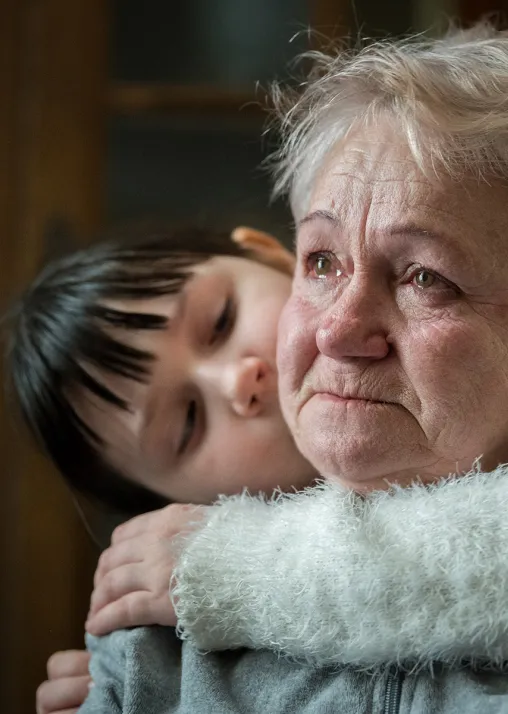
65-year-old Nataliia Zhuzha with her granddaughter Lia. Photo: LWF/Albin Hillert
Space and privacy
Each family has a room to themselves; they share a kitchen, an eating room, and a few other spaces to work, study and play. Only three children attend public school in Poland; the others follow Ukrainian lessons online. Lia (8) and Timur (10) came with their grandmother. from Energoda town in Zaporizhzhia district, close to the nuclear power plant.
The family first decided to stay in Ukraine. But in September 2022, Timur went out to buy milk and was almost hit by a shell. "I heard explosions and rode my bike very fast. I saw a crowd of people. I came closer, and I saw a person lying in blood. People cried, and there was broken glass everywhere. A tree was burning in the city center.The explosion had thrown a man’s dog away. An ambulance came and took the person that was lying there. He was a power plant worker, and people said te died." Timur tells in a quiet voice. Half a year later, he still recalls every detail of the experience. The children were building Lego checkpoints after that, his grandmother says.
Timur would like to have a cat. He wants to be a soldier and defend his country. There is no cat in Betania, but one family bought a rabbit. Timur and Artem spend time together; the boys run around the house and to the nearby river.
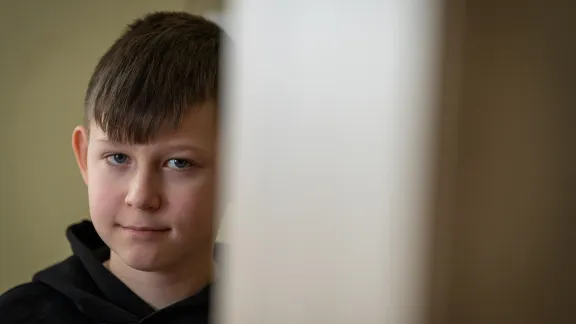
10-year-old Timor from Enerhodar (Zaporizhzhia), Ukraine, in the room which he shares with his sister and grandmother. Photo: LWF/ Albin Hillert
Supporting each other
Having a space to live and being close to other Ukrainian families is a great relief, says Nataliia Zhuzha, Lia’s and Timur’s grandmother. She has been the children’s caregiver for the past five years. At home, other family members and her son supported her. Now the family is scattered all over Europe: her daughter's family is in the Netherlands, and her son, the children's father, is in the army. "I cannot be ill. I am now mother, father, and grandmother to them", she says. She also watches Artem after school while his mother is working. Betania formed a new community of single parents who support each other and help with childcare.
Furniture, toys, items for everyday use: many volunteers and donors pulled together to help the guests in Betania. An entire room is filled with items for daily life: Towels, packs of flour, and toilet paper. "For our congregation, I think it is important that our Ukrainian guests are here," Vicar Bujok says. "It is important that Betania can help."
For now, it is impossible to say how long this help will be necessary. The families in Betania deal differently with the situation. While Timur's grandmother is only now starting contemplating enrolling the children in a local school, Artem's mother has been planning the family's future in Poland for months. Her son even asked to "go home" when they visited their house in Chernihiv in January, she says: "He said: As long as there is war, Ukraine is not home."
In Poland, LWF supports people affected by the war in Ukraine through a humanitarian country program, which also runs a community center in Bielsko-Biala. The Evangelical Lutheran Church of the Augsburg Confession in Poland, an LWF member church, has welcomed people fleeing Ukraine in many of their congregations.
In Ukraine, LWF World Service works together with the German Evangelical Lutheran Church of Ukraine, in Chernihiv oblast, and in Kharkiv.
The LWF Ukraine response is supported by many ecumenical and humanitarian partners (full list here).
